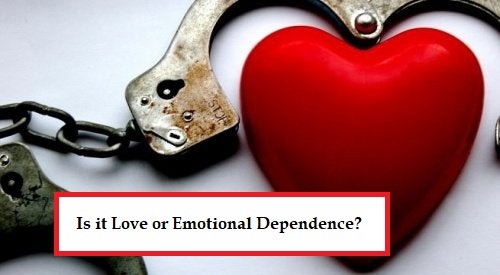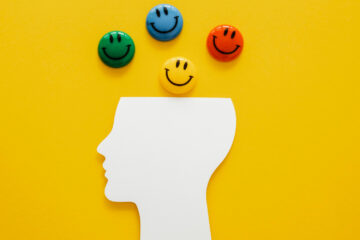Are You In Love or is it Emotional Dependence ?

Are you in love or is it emotional dependence? This is a question you must always ask yourself at the onset of your relationship. It’s also a question you must constantly ask yourself as your marriage progresses.
You are said to be emotionally dependent when you need someone else to feel happy, complete or thrive. It’s important that we always interrogate our feelings to know if what we feel is truly LOVE or EMOTIONAL DEPENDENCE. I see various individuals and couples walk into my office day in and out professing love but without knowing that rather than being “in love”, they are rather “in need”. A need that ensures they are constantly fed with approval, undivided attention and support from their partner. Emotional Dependence thrives when we refuse to give ourselves everything else we require from someone else.
When love songs explore narratives on how someone’s life had direction and meaning as a result of new-found love, they may just be talking about emotional dependence. Afterall, you are supposed to have discovered your life’s direction and uncovered your existential reason prior to falling in love. Ideally, two complete individuals should come together and fall in love. – Temple Obike
THE SIGNS OF AN EMOTIONALLY DEPENDENT RELATIONSHIP
One of the hardest distinctions to arrive at in our relational lives is learning to understand the difference between emotional dependence and love. This is because they both share very similar characteristics. Here are some of the signs noticed with clients who developed unhealthy emotional dependence on their partners or spouse.
- You are always concentrating on how your partner treats you instead of trying to understand who they are inside: When you concentrate on how you are being treated, this robs you of every opportunity to truly understand yourself. If this continues over an extended period it wields the power to erode your sense of self thereby making you dependent on external validations.
- You suddenly begin to create a personality (ideal) of the individual you believe you’re in love with: When you relate with a partner based on the ideal you created about them rather than the reality based on interactions, you may miss out on important aspects of their personality and feed yourself with delusions which could affect your expectations.
- You discover that even in past relationships, you have the proclivity to idealize your partners: Emotional dependence is a behavior that is based on life-long cognitive skills of thinking, listening, learning, understanding, justifying, questioning, and paying close attention. When you have engaged this entire process, you will have unconsciously mastered the art of seeking out skewed relationships.
- You become traumatized with the thought of losing your partner: This is a habit based on faulty attachment. This group of disorders refers to people who have emotional attachment issues, such as a lack of empathy or an obsession with another person.
Some of attachment disorders include disinhibited social engagement disorder (DSED) and reactive attachment disorder (RAD), and they both develop during childhood from negative experiences with parents or other adult caregivers.
- You gradually become possessive and a jealous person on account of your partner: You might feel the need to protect your loved one obsessively, or even become controlling of them as if they were a possession. This is a situation borne out of faulty attachment styles as explained in point 4.
- You become enamored by their ability to make you feel so worthy, special or happy: This is the classic act fail in life’s drama. Our ability to make ourselves happy is a huge responsibility but an emotionally dependent individual hands over this power to someone else. A decision that erodes the self-esteem of the dependent.
- You get anxious when your partner does not return your calls or text you back (anxiety rooted in the fact they may have found someone else more desirable): Obsessive-compulsive disorders (OCD) are a combination of obsessive thoughts and compulsive rituals. If these rituals are not healthily managed, they begin to interfere with everyday life. OCD triggers a need for constant reassurance, which can affect your relationships. These reassurances when not provided cause anxiety to build up in emotionally dependent individuals when their partners do not return calls, make them feel special or desirable.
Available on Podcast:
COMPARISON BETWEEN LOVE AND EMOTIONAL DEPENDENCY
Love Gives You, E.D Takes: True love is not a needy concept. It’s an emotion that truly gives devoid of any form of manipulation or control dynamic. When its true love, you will always support your partner and want them to become their best possible self even as they achieve all they can. This means that possessing and controlling the other person NEVER features on your agenda.
Love Values qualities, E.D idealizes it: When you are in love, you have healthy value for your partner’s qualities. This value does not revere or idolize these qualities but rather it treats it like a gift given that must be nurtured. Emotionally dependent partners begin to idolize and idealize partners/spouses and their qualities thereby building unhealthy expectations around them.
Love is freely expressed, E.D is hinged on Fear: When you love because you’re afraid of losing a partner if you don’t, that points to an emptiness that was created out of self-abandonment. An abandonment that now creates an expectation for someone else to fill the emptiness you feel. This becomes the only time you feel safe and loved. Any situation or perceived event that threatens this feeling of happiness will be met with an attempt by the emotional dependent to control. Control that tries to manipulate situation to ensure that they constantly get their fix of validation, approval, happiness or sense of worth.
When you are stuck between trying to get love and to be loving all at once, you will always find out that your need to “get love” will always win. This will always make you control and manipulate situations that kill “true love”. On the contrary when you focus on being loving, you are always on the lookout for activities and opportunities to express your love and it opens you up to truly love yourself and your partner.
WAYS TO KILL EMOTIONAL DEPENDENCY
- Truly see yourself as valuable. If you see yourself as valuable, you will always appreciate the value others bring to the table but never revere it
- Truly Love yourself. This is one of the easiest statements to make but it’s also one of the hardest to live up to. Many people do not love themselves but would rather put their needs, opinions etc. in the backburner. They then proceed to convince themselves it’s coming from a place of care for their partner’s wellbeing rather than honestly assessing the situation and telling themselves the truth that they have forgotten how to love themselves. Find out what you enjoy doing, make a list of potential hobbies, pick a new positive craft and indulge in it, take yourself out sometimes, practice self-care and so many more.
- Know your own inner Beauty. If you do not know what makes you beautiful inside you will always appreciate other people’s beauty (inner positive qualities, talents, gifts) while trivializing yours.
- Give Yourself Attention & Approval. This is key if you want to have healthy relationships with others. If you do not understand the approvals you ought to give yourself, you will hand over your joy to someone else and then become sad when they refuse to give you the approvals that was yours to begin with.
I hope learning to discover your essence and loving yourself (not to a narcissistic point) is something you begin practicing. We MUST teach our children the art of truly loving themselves as well because this is how we kill the cycle of emotional dependency across generations.
Written by Obike Temple.
Temple Obike is a licensed marriage and family therapist, speaker, author and psychotherapist who has counseled over one thousand, two hundred clients comprising of couples, individuals, abuse victims (substance, physical, emotional and sexual) and grief-stricken clients. With over 70,000 in-counseling minutes (1,000+ hours) accrued in practice. He runs his private psychotherapy & counseling practice out of Lagos, Nigeria and has counseling centers in Abuja and Port-Harcourt. His practice also provides options for both online and on-site services.
He’s happily married to his primary school sweetheart and their union has been blessed with four amazing children who he’s very proud of. Temple also owns an advertising agency Brand Envoy Africa where he positions products and services using his innate understanding of human psychology. His private practice has positively empowered lives through his online counseling, podcasts, free advisory services and free online materials. Readership of his articles also receive a growing number of visitors alongside subscriptions to his email newsletter at templeobike.com. His passion for empowering and uncovering the secrets to lifelong marriages and personal development led to his new book titled “Soul Bodega” available on amazon and across other online and traditional stores.
Never give up on yourself! You are a journey through various destinations.
Follow me on Facebook, Instagram, LinkedIn, and visit my website for more info!















